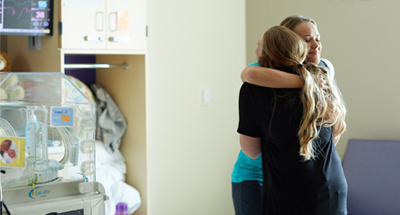Postpartum Services
New Baby, New Needs for Mom

Postpartum Services
New Baby, New Needs for Mom

We are here for new moms
We know that being a new mother can be an overwhelming experience whether it's your first child or your fourth child. Our postpartum services are here to help new mothers navigate this experience whether their baby was delivered at Children's Mercy or their baby was delivered elsewhere and is now a Children's Mercy patient.
All postpartum services are coordinated by women's health nurse practitioner, Heidi Garcia, and offer our new mothers helpful tools, tips and equipment that can help them through the stress of bringing a new life into the world.
How to request postpartum services
We want to meet the needs of postpartum mothers whose children are patients at Children's Mercy, but want to do so in the safest and most efficient way possible. If you did not deliver at the Fetal Health Center, here are the steps we recommend:
- Call your primary obstetrician (the doctor who delivered your baby).
- If contacting your primary obstetrician is not possible, please call the Fetal Health Center at (816) 234-9330.
- This would be for a non-urgent complaint as a signed release of information for medical records must be completed and records must be received prior to scheduling an appointment.
- If you cannot wait 24-48 hours to schedule an appointment with the Fetal Heart Center, contact your primary obstetrician or go to the closest emergency department.
Preeclampsia
Postpartum preeclampsia is a serious condition related to high blood pressure that may happen within the first week after delivery. Read about postpartum preeclampsia to learn the symptoms of and when you should seek medical attention.
In addition, use the links below to learn when to seek medical attention for different symptoms you may experience after giving birth.
- An incision from a c-section that becomes more painful
- An incision from a c-section that becomes red, swollen, begins to open or has increased leaking of fluid
- Bleeding heavier than a normal period, or large clots bigger than an egg, or soaking more than 1 pad per hour
- Chills, aches or pains
- Dizziness or fainting which could come or go or that doesn’t go away
- Feelings of life being hopeless, like you don’t have control over your life
- Fever higher than 100.4°F
- Headaches that won’t go away or get worse over time even after taking medication
- Increased sadness, crying that doesn’t stop, or inability to care for yourself or baby
- Pain or burning when urinating
- Pain, redness or swelling in one or both of your legs
- Really bad nausea and throwing up
- You are unable to drink anything for longer than 8 hours or eat anything for longer than 24 hours
- Red and painful lumps in your breast(s)
- Scary thoughts or are worried all the time
- Severe back pain preventing you from caring for yourself or your baby
- Stiches in or around the vagina from a vaginal delivery that open or worsen in pain or leaking of fluid
- Trouble focusing
- Vaginal bleeding or leaking of fluid that smells bad or looks like tomato soup
- Vision changes like blurry vision, seeing flashes of light, bright spots or seeing double
- Chest pain or fast-beating heart
- Feel tightness in the center of your chest which could come with pain in your back, neck or arm
- Feel like your heart is being fast or pounding in your chest that could come along with feeling dizzy, faint or confusion
- Trouble talking and breathing
- Extreme swelling in your face, arms, or legs which might look like…
- Not being able to bend your fingers or wear rings
- Not being able to open your eyes all the way because they are so puffy
- Not feeling your lips or mouth because they are so swollen
- Family and friends are worried about your safety or that you might hurt others
- Feel out of touch with reality or seeing or hearing things other people don’t
- High blood pressure, 160/110 or higher
- Obstructed breathing or shortness of breath
- Feel like you can’t breathe deeply enough, or your throat or chest feel tight
- Trouble breathing when lying flat so that you need pillows to prop you up while you sleep
- Seizures or experiencing a gap in time of which you have no memory
- Severe belly pain or cramping
- Sharp, stabbing pain in your belly that happens suddenly which doesn’t go away and that may or may not get worse over time.
- Thoughts of wanting to hurt yourself or others
New Baby, New Needs for Mom
New Baby, New Needs for Mom
It takes months to recover and heal from pregnancy, labor and delivery. Children's Mercy provides information to prepare and support new moms in taking care of your postpartum body.
Children’s Mercy has a lactation team to provide new moms with personalized education in breast feeding and pumping.
Grief is a normal reaction to the death of a loved one, and for many parents going through the death of a baby, it is also the loss of all the experiences and milestones that will be missed. Children's Mercy offers grieving parents information and resources on how to cope with the wide range of emotions commonly experienced with the loss of a baby.
With a new baby in the hospital, it can be easy for a mother to put her care at the bottom of the list. Children's Mercy provides tips and resources on dealing with postpartum emotions to help new moms make themselves a priority.
